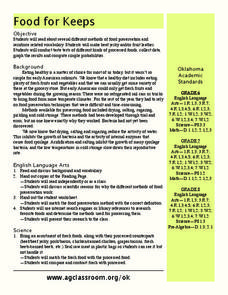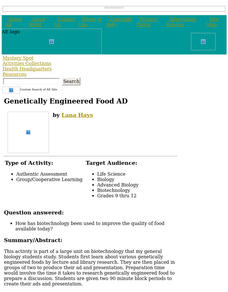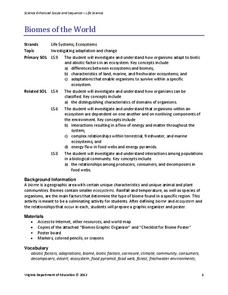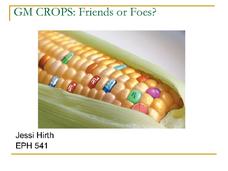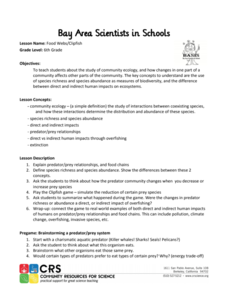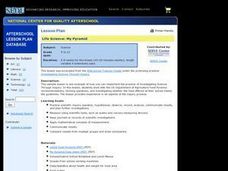Curated OER
The Quicker the Better? Food Processing
Sixth graders evaluate the nutrition of various foods. In this healthy eating lesson, 6th graders discuss the processing of many common foods and what this means. Students identify and research unfamiliar ingredients in processed foods...
Curated OER
Food For Keeps
Students explore food. In this processed and fresh foods lesson, students discover how some foods are processed and how they differ from fresh food. The complete group activities and an individual reading assignment. This lesson includes...
Curated OER
Genetically Engineered Food AD
Students examine various genetically engineered foods by lecture and library research. They are then placed in groups of two to produce their ad and make a presentation on a food they have developed.
Curated OER
Coffee & Chocolate: Knowing Healthy Foods
An article relaying vital information about health and nutrition are the backbone of this lesson on eating the right foods. A series of activities are used to help upper graders understand the science supporting our understanding of what...
Curated OER
Snack Attack - Food Packaging
Class members examine a variety of snack foods, noting the packaging that they come in. They work in groups to design a heat-proof and waterproof package that will safely transport a s'more snack. They test to see if it prevents the...
Curated OER
Jeopardy 8th Grade (Science)
There are so many topics touched upon in this Jeopardy-style science game, that it is difficult to classify! The categories include electricity, matter, ecology, earth and space, and scientific investigation. This would best be used at...
Baylor College
They're Everywhere: Bacteria
Totally gross out your class with the eighth lesson in this series on food science. Explore the microscopic world of bacteria by taking swabs of different classroom objects and growing colonies in petri dishes. An engaging activity that...
Curated OER
Healthy Eating
A highly informative presentation focuses on healthy diets, food facts, the food pyramid, and healthy eating myths. There is a lot of great information in this PowerPoint, and a really fun interactive component. Perfect for your upper...
Virginia Department of Education
Biomes of the World
Incorporate knowledge about biomes and ecosystems in multiple ways while encouraging creativity. Emerging ecologists collaborate and perform research to complete a graphic organizer about various biomes of the world. They conclude the...
Curated OER
GM Crops: Friends or Foes?
Genetically modified crops—How do you feel about them? Here, explore the benefits and risks of GM crops to inform your opinion.
Learning Games Lab
Gram Staining
Scholars use a lab simulation to test contaminated yogurt for bacteria by gram staining. They learn proper lab procedures for handling bacteria and for sterilizing equipment, and then walk through the process on their own to try gram...
Community Resources for Science
Food Webs/Clipfish
Human impact on habitats can be alarming. A hands-on activity has learners explore the impact of human interactions with different environments using a gamified approach. They simulate the impact of a species' abundance under different...
US Environmental Protection Agency
Aquifer in a Cup
Young scientists create their very own aquifers in this science lesson on ground water. After learning about how some people get their drinking water from underground wells, young learners use sand, modeling clay, and aquarium rocks to...
College Board
2009 AP® Environmental Science Free-Response Questions
How do genetically modified crops affect agricultural practices? This is one of four environmental questions scholars respond to in an AP® test prep resource. Other topics include methane digesters, water runoff, and nitrogen-based...
College Board
2001 AP® Environmental Science Free-Response Questions
Water quality testing often reveals interesting facts about the local environment. Scholars respond to several AP® questions highlighting topics such as air pollution, water pollution, and the spread of disease. Each question requires a...
Curated OER
Wetland Food Webs
Students study life science. In this food webs and food chains comparison instructional activity, students examine the wetlands to discover the relationships that exist between the animals that live there. They participate in group...
Curated OER
Food Chains
Fourth graders study food chains, producers, consumers, and decomposers. They play a food chain game and create food chain mobiles or posters. They take a nature hike around the school and observe various parts of a food chain.
Curated OER
Life Science: My Pyramid
Students examine how the school food program compares to the food pyramid recommendations. For this food pyramid lesson, students compile data regarding the food choices available in the school through the lunch program and vending...
Curated OER
Food Chain
Students participate in a simulation of the food chain. In this animal diet lesson, the teacher introduces students to the food chain, then assigns each student a part of the food chain to represent. The sun begins sending energy along...
Curated OER
Food Chains
Students study food chains by creating their own slide show using KidPix. They compare information after sharing their slide shows as a whole group. As the children are watching the slide shows of their peers, they tally every time...
Curated OER
Food Chain
Third graders explore why food chains are important. In this food chain lesson, 3rd graders break into small groups to represent parts of the food chain. Different amounts of food are given to each group and any spilled food will be...
Curated OER
Food Chains & Food Webs
Tenth graders examine how energy is lost through different trophic levels. In this trophism lesson students construct a food web and view a video.
Curated OER
Down with Dairy and the Food Pyramid
Learners discuss food pyramid, name parts of pyramid, discuss dairy products and how they are beneficial to people, and participate in dairy taste testing.
Curated OER
Ecology - Food Chains
Students discuss the concept of a food chain in the California ecosystem. in this food chain lesson, students look at different cards and sort them into herbivores, carnivores, decomposers, and omnivores. Then they use these cards to...
Other popular searches
- Science Project Food
- Science Animal Food Chain
- Food Science Experiments
- Food Science Vocabulary
- Food Science Careers
- Consumer Science Food
- Spanish Food Science
- Simple Food Science
- Food Science Service Project
- Food Science Nutrition
- Nutrition and Food Science
- Food Science Lesson Plan

